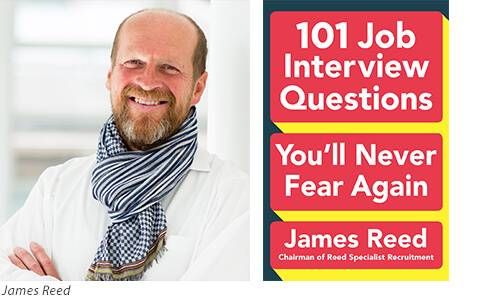What to Tell Job Interviewers About a Gap in Your Resume
Tips From '101 Job Interview Questions You'll Never Fear Again'
(This article is excerpted from 101 Job Interview Questions You’ll Never Fear Again by James Reed, published in the U.S. on May 3rd by Plume, an imprint of Penguin Publishing Group, a division of Penguin Random House LLC. Copyright © 2014 by James Reed.)
Moments of life-changing destiny are most likely to present themselves in the form of a job interview. With so much resting on the outcome, it’s no wonder interviewees get nervous. So learning how to get just a little better at job interviews is one of the best-value things you can do for yourself.
One way to do this, if you’re been out of work for a bit, is to be prepared with an answer if a job interviewer says: Talk me through the gaps in your resumé.
That’s code for questions like: Did you stay at home watching TV for six months? Were you in jail? Is there something wrong with your mindset?
One recent research study out of Northeastern University, using fictitious résumés, found managers would rather hire someone with no relevant experience than someone who has been out of work for over six months. Other studies have drawn similar conclusions.
Given the recent economic troubles, it is hugely unjust that some firms see people who have been long-term unemployed as potentially lazy, embittered or out of date, but some do. It’s not fair, but there it is.
What Interviewers Want to Know
So when an interviewer is probing a long gap in your work history, he or she is really trying to find out whether you have a flaw in your work ethic or your mindset.
Many people have perfectly acceptable reasons for gaps in their employment record such as:
- Caring for an ill family member
- A medical issue or accident
- Education or training
- Traveling
If any of these apply to you, good. Simply tell the interviewer what you were up to in a non-defensive manner and stress how ready you are to get back to work.

Emotional, personal matters should be dealt with matter-of-factly, but not dwelled on. Turn the conversation back to your enthusiasm for returning to work as quickly as possible without sounding uncaring about a major illness or loss.
Further training is the most likely reason to be viewed favorably. Also, if you were on a gap year or other type of adventure abroad, many interviewers will see that as a sign of your gumption, adaptability and curiosity. Just take care to emphasize that the travel bug is now thoroughly out of your system and you’re ready to settle down.
Medical issues can be viewed with wariness if the employer thinks you’re likely to fall ill again or take a lot of sick leave. So stress that the problem is resolved, assuming that’s the case, and that your previous health issues won’t affect your future performance.
Show How You're Still Vital
If you have been out of the labor market for more than a few months, explain how you have kept up to date with events in your industry and how you have kept your skills sharp.
Did you work occasionally as a consultant or on a contract basis? Include that on your résumé and in your response.
Did you apply your job skills by volunteering? That’s a good thing to tell the interviewer.
If you had a chance to learn anything relevant during your time out of the job market — from social media to a foreign language — by all means mention that.
This way, when you’re asked to walk the interviewer through the gaps in your résumé, you can be honest and say that, while it took a while to find the right position after you left ABC Ltd., you used your time doing X, Y and Z, learning valuable lessons for the job at hand all the while.
Interviewers understand that life is complicated and difficulties crop up. They just want to be reassured that you’ve met those difficulties head on rather than giving in to pessimism or inertia.
Honesty and Confidence Are Key
Whatever your situation, be honest and confident in your answer. There is nothing that will put off an employer more than a story that shifts over the course of a conversation or a person who is shifty in how he or she tells it.
If you claim that a break was a rejuvenating sabbatical, you will torpedo any chances of getting the job if it emerges over the course of the interview that this “sabbatical” was really an involuntary period of unemployment following a layoff.
Stressing the positive aspects of a trying situation is not only fine, but recommended. Bending the truth is not.
Similarly, appearing less than confident about your explanations can give the appearance that you might be hiding something. If you are going to tell the interviewer how your volunteer work kept you sharp, do it with a confident voice and your chin held high. Mumbling or getting defensive is a dead giveaway that you’re unsure of the value of that experience. Then the interviewer is going to question it, too.
If you’re ready with the right answers to a question about a gap on your resumé, though, you’ll be able to push through to other topics demonstrating what a great employee you’d be.

